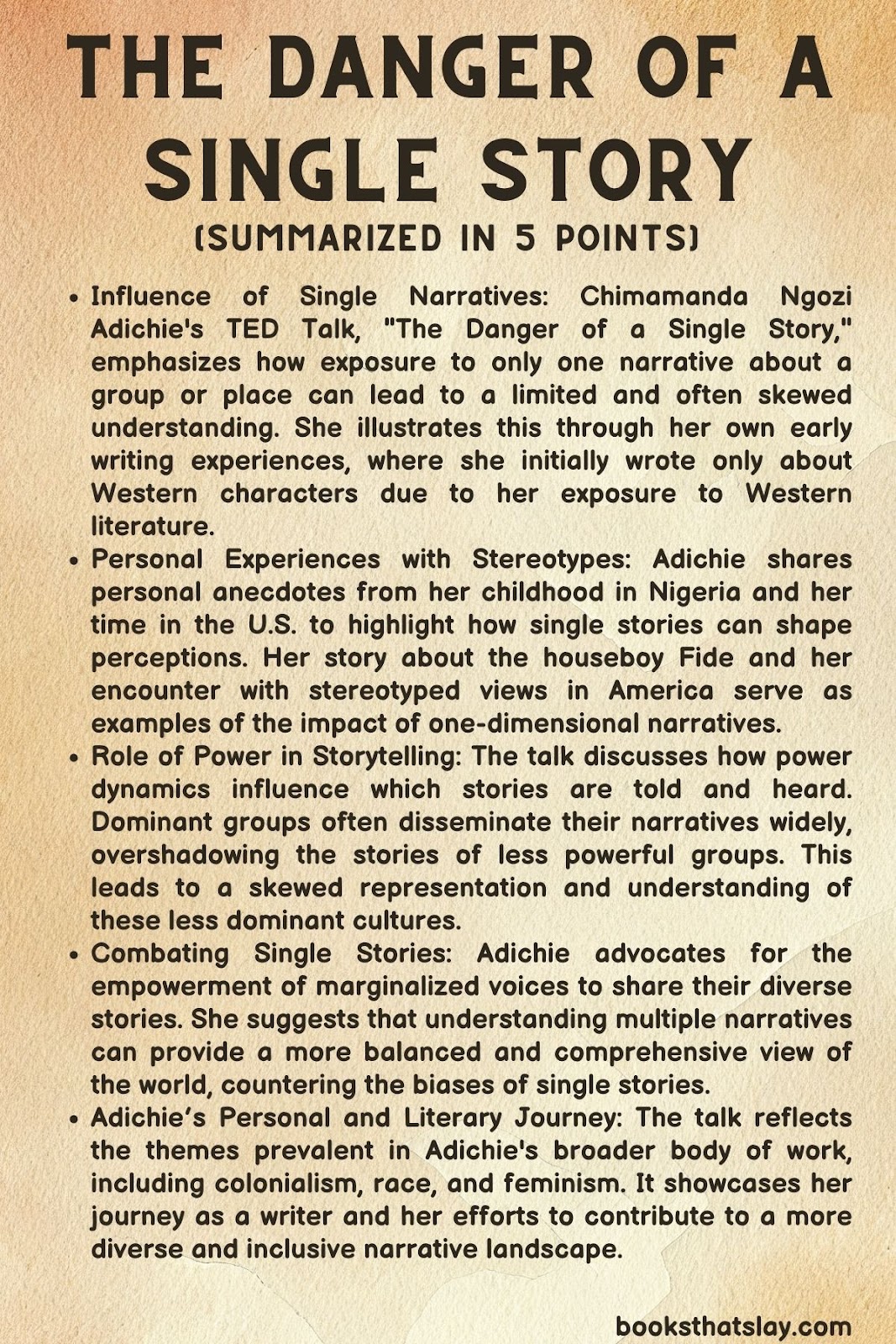The Danger of a Single Story Summary, Themes and Analysis
“The Danger of a Single Story,” a compelling TED Talk by Chimamanda Ngozi Adichie, presented at TEDGlobal 2009, delves into the profound influence of stories and the risks of accepting a singular narrative about a place or group.
This talk has not only sparked introspective conversations worldwide but also found a place in educational settings.
Summary
Adichie’s journey as a young, aspiring writer began with stories centered around white characters in Western settings, influenced solely by Western literature. This narrow perspective shifted dramatically when she encountered the works of African writers like Chinua Achebe, illuminating the limitations of her own “single story.”
Adichie also reflects on her own susceptibility to stereotyping, as exemplified by her perception of their houseboy Fide, whom she initially saw only as an object of pity.
Her experience in an American college brought another dimension to her understanding of single stories, as she confronted stereotypes held by her peers and professors about Africa.
Adichie uses these personal anecdotes to critique the colonialist underpinnings of Western literature’s monolithic narrative about Africa. She empathizes with Westerners exposed to these single stories, drawing a parallel with her own altered perceptions during her stay in America and her subsequent surprise at the diversity of Mexico.
Adichie underscores the crucial role of power in shaping narratives. Dominant cultural and economic groups often define lesser-powered groups through their stories, while also having the means to tell a multitude of their own.
She acknowledges that while stereotypes born from single stories might contain elements of truth, they fail to encompass the whole reality.
To challenge these singular narratives, Adichie emphasizes the importance of allowing marginalized groups to share their diverse experiences.
She contemplates the potential shift in her college roommate’s perspective had she been exposed to the richness of Nigerian culture through its writers, professionals, and artists.
In pursuit of this goal, Adichie and her publisher founded a non-profit aimed at building libraries, enriching school book collections, and organizing workshops in reading and writing.
She concludes her talk by urging her audience to seek out varied perspectives to dismantle the single stories they’ve encountered.
Adichie’s talk is a reflection of her broader work, where she explores themes of colonialism, race, class, and feminism, blending her Nigerian and American experiences with her academic background in African history.

Themes
1. The Impact of Colonialism on Narratives
Adichie’s talk thoughtfully examines how colonialism has deeply influenced the way stories are told and perceived, especially in the context of African nations.
She explores how Western narratives, shaped by a colonialist lens, have often simplified or misrepresented the complexities of African societies, cultures, and histories.
This theme extends to a critique of the dominant narratives that continue to shape global perceptions, underlining the importance of understanding the historical and cultural contexts in which these narratives are formed.
Adichie’s insights encourage a reevaluation of how colonialism’s legacy persists in the stories we consume and the stereotypes we unwittingly propagate.
2. Power Dynamics in Storytelling
Central to Adichie’s discussion is the concept of power in the realm of storytelling.
She delves into how those in positions of power – be it cultural, economic, or political – wield significant influence over the creation and dissemination of narratives.
This theme highlights the disparity between those who have the means to tell their stories and those whose stories are often untold or oversimplified.
Adichie challenges us to consider how power imbalances shape our understanding of the world, emphasizing the need for diverse voices and perspectives in literature and media to present a more holistic and authentic portrayal of different communities and cultures.
3. The Complexity of Identity and Stereotypes
Adichie’s talk is a profound exploration of identity and the dangers of reducing individuals or groups to a single, often flawed, narrative.
Through her own experiences and observations, she illustrates how stereotypes are formed and perpetuated, and how they can obscure the rich, multifaceted nature of individual and collective identities.
This theme invites a reflection on the ways in which we perceive others and ourselves, urging a move away from simplistic categorizations towards a more nuanced understanding that appreciates the diversity within every community.
Adichie’s narrative underscores the importance of personal stories in breaking down stereotypes and fostering a deeper, empathetic understanding of the varied experiences that shape human life.
Final Thoughts
Chimamanda Ngozi Adichie’s “The Danger of a Single Story” is a powerful reminder of the multifaceted nature of human experience and the perils of reducing complex societies and individuals to monolithic narratives.
Her eloquent, personal, and insightful approach not only highlights the significance of diverse storytelling but also challenges us to seek and embrace a variety of perspectives in our understanding of the world.
Adichie’s message is particularly resonant in today’s globalized world, where stereotypes can easily proliferate but can be just as readily dismantled through conscious efforts to broaden our narrative horizons.